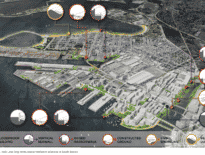
Boston’s sky-high cost of living – driven largely by expensive housing – could be its undoing if high earners take advantage of remote work to move to sunnier cities.
Massachusetts and Greater Boston in particular have enjoyed a run over the past few decades that has been nothing short of remarkable.
On the verge of Rust Belt status back in the 1970s, the Hub embarked on a remarkable turnaround, one that has seen the Boston join the ranks of a small number of elite, metro markets that have become both a magnet for New Economy companies and drivers of the whole U.S. economy.
But vaccine or no vaccine, COVID-19 has set the stage for what are likely to be some big, permanent changes to the real estate market, suggests a new report by analysts at UBS.
And that could provide a comeuppance of sorts for Greater Boston, triggering changes that could knock the city and the state as well off its lofty perch.
Cities Will Rebound
The report steers clear of such simplistic, panicky predictions such as the suddenly–popular idea that cities are dead meat, even as it points to some substantial changes in the months and years ahead in where we live and work.
Much has been made of the flight to the suburbs, and there is certainly something happening there, in the Boston area as well as in New York and other major cities.
Brokers in the suburbs of Boston are reporting a big uptick in interest from Millennial buyers looking to move out of the city, with reports of bidding wars in the suburbs surrounding the Big Apple as well.
The coronavirus and the shutdown of urban amenities like museums, restaurants, ballparks, bars and nightspots have stripped, at least temporarily, much of the appeal of urban life, while also driving a desire for more living space and a little bit of green space to stretch out in.
The pandemic may also be helping accelerate a trend that was already coming due, as 30-somethings start to have children and start to think of the suburbs in a different light, UBS analysts note.
But real as it may be, a bit of outmigration to the ‘burbs isn’t going to kill city living, or on its own trigger an irreversible decline in Boston or in any other of the nation’s leading urban hubs.
That’s not to say there won’t be collateral damage.
The emptying out of downtown office markets across the country has devastated the ecosystem of small restaurants, shops and other service providers who sprang up in Boston and other cities across the country, with some small businesses likely gone for good at this point.
There is also likely to be a drop in demand for new downturn luxury apartment towers as well, a sector that already appears built out – and then some – in Boston.
That said, analysts at UBS reiterated what they called their “strong belief” that cities will rebound, not crumple, as the pandemic finally recedes.
“Large, dense cities will ultimately see a substantial return of residents, particularly once a vaccine is available and social distancing limitations are eliminated,” they contend.
But Will Tax Revenues?
But the changes wrought by COVID-19 that could have the most detrimental and long-standing impact on vitality and future of Greater Boston can be found in the corporate world, and what appears to be a significant shift towards remote work.
Companies large and small are looking at a “multipronged solution to utilizing office space” that includes some employees working remotely full-time and some who had been commuting to downtown towers shifting to suburban offices, analysts at UBS note.
Now here’s where the rubber meets the road for Boston and other stratospherically costly metro markets.
Once workers and companies are untethered from a certain city or location, it frees up all sorts of alternative possibilities for living and working.
“Interstate migration is by no means a new phenomenon, but it is likely to pick up steam as a result of COVID-19,” the report notes. “We believe there are a number of contributing factors to this, including economics – there are states that have significantly lower costs of living in terms of real estate costs and taxes.”
But whereas in the past it was working and middle-class families pulling up stakes and leaving the Bay State to find more affordable homes and apartments elsewhere, the shift to remote work could see a surge of higher-income professionals leave for sunnier, cheaper climes.
The loss of these higher-paid professionals, whose jobs are frequently doable remotely, could strike a significant blow to already reeling state and local tax revenues, putting us in danger, as the report says of “a vicious spiral.”

Scott Van Voorhis
The UBS report offers a stark warning. And while the analysts likely have New York in mind, Greater Boston is far from immune, with similar dynamics at work.
Much of Eastern Massachusetts has been much too expensive to live in for years now, with some of the country’s highest home prices.
Now with COVID-19 having pushed remote work firmly into the mainstream of corporate life, we may be poised to finally pay the price for years of short-sighted housing and zoning policies.
Scott Van Voorhis is Banker & Tradesman’s columnist; opinions expressed are his own. He may be reached at sbvanvoorhis@hotmail.com.




 |
| 

